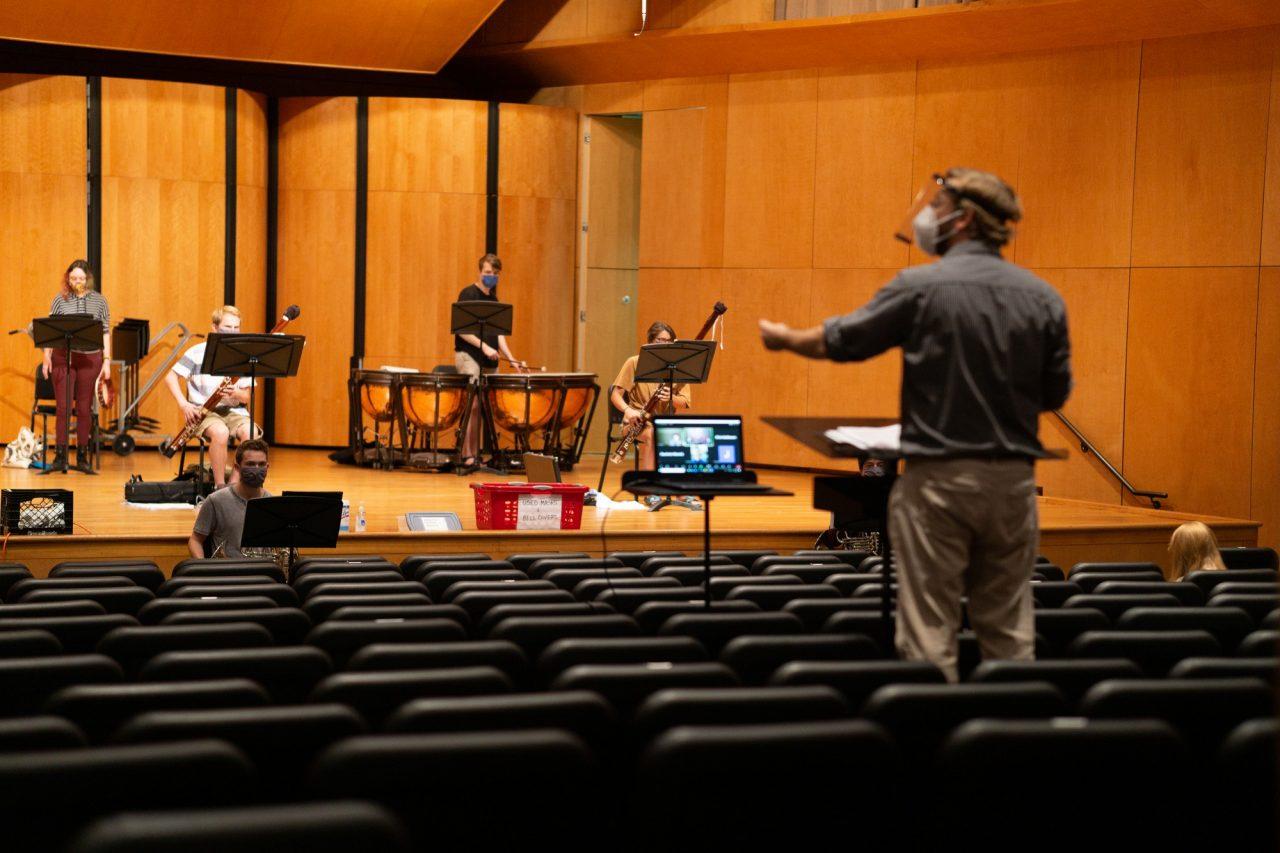photo by Kate Nuelle
Given the restrictions set in place due to the COVID-19 pandemic, Trinity’s music department has been met with predictable roadblocks. The music department has dedicated time to researching, studying and planning ways to ensure a safe season. Since the beginning of the fall semester, various calculated health measures have been implemented in the music department to maintain the spirit of a music ensemble while still ensuring the safety of its members.
From purchasing air filters, UV wands and custom bell covers that reduce the spread of aerosols to implementing strict and safe practice systems, James Worman, assistant professor of music and director of the Wind and Percussion ensemble, has committed hours of his personal time ensuring that the fall semester runs as smoothly as possible by addressing every potential risk and challenge.
“Many students come to Trinity because the music program is really strong and want to continue their meaningful engagement with music. Shutting down the department wouldn’t work, so we were determined to make sure it happened,” Worman said. “We’ve had about six rehearsals now. It’s still not normal, but I can tell from body language and how they come into the room that they feel safe and confident that we can make this work.”
The effort that the music department is putting in to create a comfortable environment is evident to the members of the music department. Caroline Harrison, Trinity Symphony Orchestra (TSO) oboe player and chamber group member, expressed her satisfaction and gratitude for the work that has been put in.
“We are living in challenging times and for many of us playing music is a way to find peace. I am grateful that [Joseph Kneer, assistant professor of music] and other leaders at the music department are willing to put in the extra work and creativity to allow us to do something this semester, even if it wasn’t what we expected. I’m witnessing the time, effort and creativity that has been put into this program to allow us to play and the cooperation involved, and it has shown me that if we are willing to be flexible, we can still have productive and fulfilling experiences,” Harrison said.
Although Ruth Taylor Recital Hall has been measured out by Worman and would be able to accommodate a socially distanced wind ensemble for a recorded concert, the potential risk is still a concern to Worman, who has had to shift his approach to composition and rehearsals. Rehearsals now consist of 50-minute segments rotating sectionals instead of the usual two hours, twice a week. For example, violins rehearse one hour on Monday, and lower strings—cellos, basses, and violas—rehearse the next hour after a twenty minute break to allow for the least amount of exposure.
Meg McDonald, a sophomore trumpet player in Trinity’s Wind Ensemble, expressed her optimism in the way rehearsals have changed to meet health guidelines.
“We now have access to only a couple rooms for practicing purposes, and after we use a room, there is a required ‘air-re-circulation’ time before another person can use the room. During group rehearsals, all of the chairs are spaced apart from each other and in straight lines as more precaution to prevent aerosol spread,” McDonald said. “Although the changes to the music department are quite disruptive, I feel comfortable knowing that Dr. Worman is doing what he can to keep us all safe and give us the opportunity to still be in band.”
Similar to McDonald, Amy Nguyen, a first-year TSO cello player, also expressed her gratitude for the changes that have been implemented.
“I am happy to be able to play in an orchestra, but the changes we are undergoing this semester makes playing as a group much harder,” Nguyen said. “I see performing as more of a privilege now because I know that lots of schools would cancel music performances altogether.”
Chloe Scroggins, a sophomore TSO viola player, provided a different perspective due to being a remote player.
“Since we have shorter rehearsals, [fewer] days together and trying to count measures while on Zoom, it is hard to learn the music as you go, and I have to start taking more time to practice with recordings rather than listening to class. It exposes a lot of individual playing since we have to send in recordings and really have to project our sound if we are in person,” Scroggins said.
Despite these setbacks, Scroggins is grateful for the privilege to play music and have some sense of normalcy among so many changes, just like the other ensemble members.
“I’m glad they are providing the space to play music because it is an important part of peoples’ lives to just connect musically and socially,” Scroggins said.







